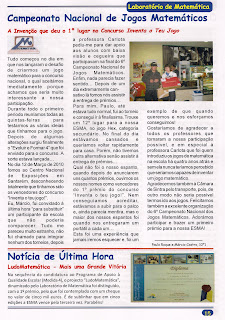Friday, April 15, 2011
Thursday, February 3, 2011
Wednesday, August 25, 2010
Jogar e trabalhar... santíssima díade !
Games like World of Warcraft give players the means to save worlds, and incentive to learn the habits of heroes. What if we could harness this gamer power to solve real-world problems? Jane McGonigal says we can, and explains how.
Jane McGonigal asks: Why doesn't the real world work more like an online game? In the best-designed games, our human experience is optimized: We have important work to do, we're surrounded by potential collaborators, and we learn quickly and in a low-risk environment. In her work as a game designer, she creates games that use mobile and digital technologies to turn everyday spaces into playing fields, and everyday people into teammates. Her game-world insights can explain -- and improve -- the way we learn, work, solve problems, and lead our real lives.
McGonigal directs game R&D at the Institute for the Future, a nonprofit forecasting firm where she developed Superstruct, a massively multiplayer game in which players organize society to solve for issues that will confront the world in 2019. She masterminded World Without Oil, which simulated the beginning of a global oil crisis and inspired players to change their daily energy habits. McGonigal also works with global companies to develop games that build on our collective-intelligence infrastructure -- like The Lost Ring, a mystery game for McDonald's that became the world’s biggest alternate reality game, played by more than 5 million people. (Not to mention the delightful Top Secret Dance-Off, which taps that space in our brains where embarrasment and joy mingle.) She's working on book called Reality Is Broken: Why Games Make Us Happy and How They Can Change the World.
McGonigal directs game R&D at the Institute for the Future, a nonprofit forecasting firm where she developed Superstruct, a massively multiplayer game in which players organize society to solve for issues that will confront the world in 2019. She masterminded World Without Oil, which simulated the beginning of a global oil crisis and inspired players to change their daily energy habits. McGonigal also works with global companies to develop games that build on our collective-intelligence infrastructure -- like The Lost Ring, a mystery game for McDonald's that became the world’s biggest alternate reality game, played by more than 5 million people. (Not to mention the delightful Top Secret Dance-Off, which taps that space in our brains where embarrasment and joy mingle.) She's working on book called Reality Is Broken: Why Games Make Us Happy and How They Can Change the World.
"Instead of providing gamers with better and more immersive alternatives to reality, I want all of us to be become responsible for providing the world with a better and more immersive reality."Jane McGonigal
A Década dos Jogos - a camada lúdica
"Proud Princeton dropout" Seth Priebatsch runs SCVNGR, a mobile start-up trying to build the game layer on top of the world.
Tuesday, August 17, 2010
Monday, August 2, 2010
Wednesday, June 30, 2010
Do ATITUDES
Aqui vai a página 15 do ATITUDES, jornal da E. S. com 3º Ciclo do EB de Matias Aires (Ano 13, nº 60, 3º período 2009/2010)
Subscribe to:
Comments (Atom)


